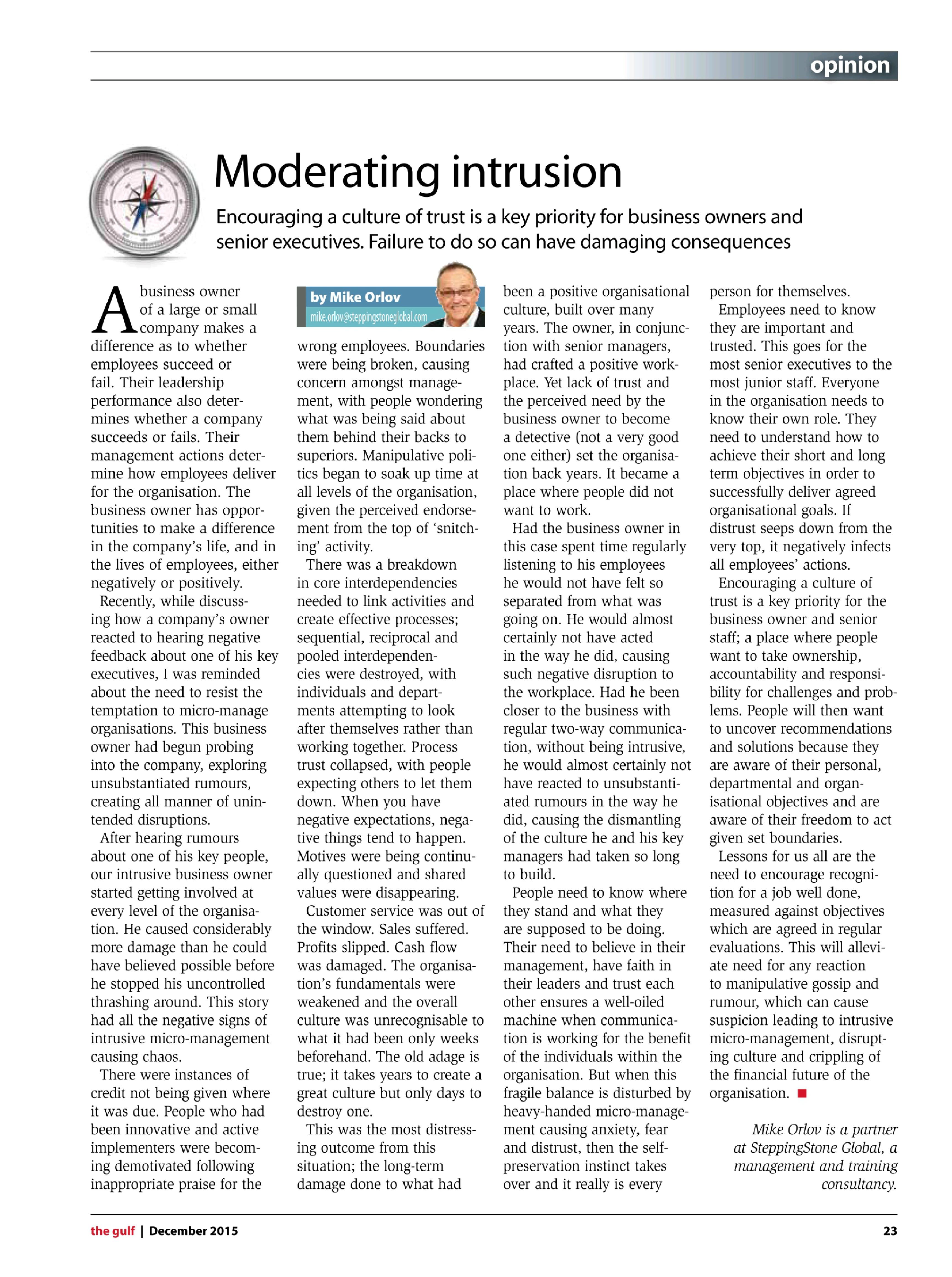A business-owner of a large or small company makes a difference as to whether employees succeed or fail. Their leadership performance also determines whether a company succeeds or fails. Their management actions determine how employees deliver for the organization. The business-owner has opportunities to make a difference in the life of a company and in the lives of employees; either negatively or positively.
Recently, while discussing how a company’s owner reacted to hearing negative feedback about one of his key executives, I was reminded about the need to resist the temptation to micro-manage organizations. This business-owner had begun probing into the company, exploring unsubstantiated rumors, creating all manner of unintended disruptions.
After hearing the rumors about one of his key people, our intrusive business-owner started getting involved at every level of the organization. He caused considerably more damage than he could have believed possible before he stopped his uncontrolled thrashing around. This story had all the negative signs of intrusive micro-management causing chaos.
There were instances of credit not being given where it was due. People who had been innovative and active-implementers were becoming demotivated following inappropriate praise for the wrong employees. Boundaries were being broken, causing concern amongst management, with people wondering what was being said about them behind their backs to superiors. Manipulative politics began to soak up time at all levels of the organization given the perceived endorsement from the top of ‘snitching’ activity.
There was a breakdown in core interdependencies needed to link activities and create effective processes; sequential, reciprocal and pooled interdependencies were destroyed, with individuals and departments attempting to look after themselves rather than working together. Process trust collapsed, with people expecting others to let them down. When you have negative expectations, negative things tend to happen. Motives were being continually questioned and shared values were disappearing.
Customer service was out of the window. Sales suffered. Profits slipped. Cash flow was damaged. The fundamentals of the organization were weakened and the overall culture was unrecognizable to what it had been only weeks beforehand. The old adage is true; it takes years to create a great culture but only days to destroy one.
This was the most distressing outcome from this situation; the long-term damage done to what had been a positive organizational culture, built over many years. The owner, in conjunction with his key senior management team, had crafted a positive workplace. Yet lack of trust and the perceived need by the business-owner to become a detective (not a very good one either) set the organization back years. It became a place where people did not want to work.
Had the business-owner in this case spent time listening to his employees on a regular basis he would not have felt so separated from what was going on. He would almost certainly not have acted in the way he did, causing such negative disruption to the workplace. Had he been closer to the business with regular two-way communication, without being intrusive, he would almost certainly not have reacted to unsubstantiated rumors in the way he did, causing the dismantling of the culture he and his key managers had taken so long to build.
People need to know where they stand and what they are supposed to be doing. Their need to believe in their management, have faith in their leaders and trust each other ensures a well-oiled machine when communication is working for the benefit of the individuals within the organization. But when this fragile balance is disturbed by heavy-handed micro-management causing anxiety, fear and distrust, then the self-preservation instinct takes over and it really is every person for themselves.
Employees need to know they are important and trusted. This goes for the most senior executives to the most junior staff. Everyone in the organization needs to know their own role. They need to understand how to achieve their short and long term objectives in order to successfully deliver the agreed goals for the organization. If distrust seeps down from the very top of an organization, it negatively infects all employees’ actions, creating the situation which we have just been reviewing.
Encouraging a culture of trust is a key priority for the business-owner and senior staff; a place where people want to take ownership, accountability and responsibility for challenges and problems. People will then want to uncover recommendations and solutions because they are aware of their personal, departmental and organizational objectives and are aware of their freedom to act given set-boundaries.
Lessons for us all are the need to encourage recognition for a job well done, measured against objectives which are agreed in regular evaluations. This will alleviate the need for any reaction to manipulative gossip and rumor, which can cause suspicion leading to intrusive micro-management, disrupting culture and crippling of the financial future of the organization.

